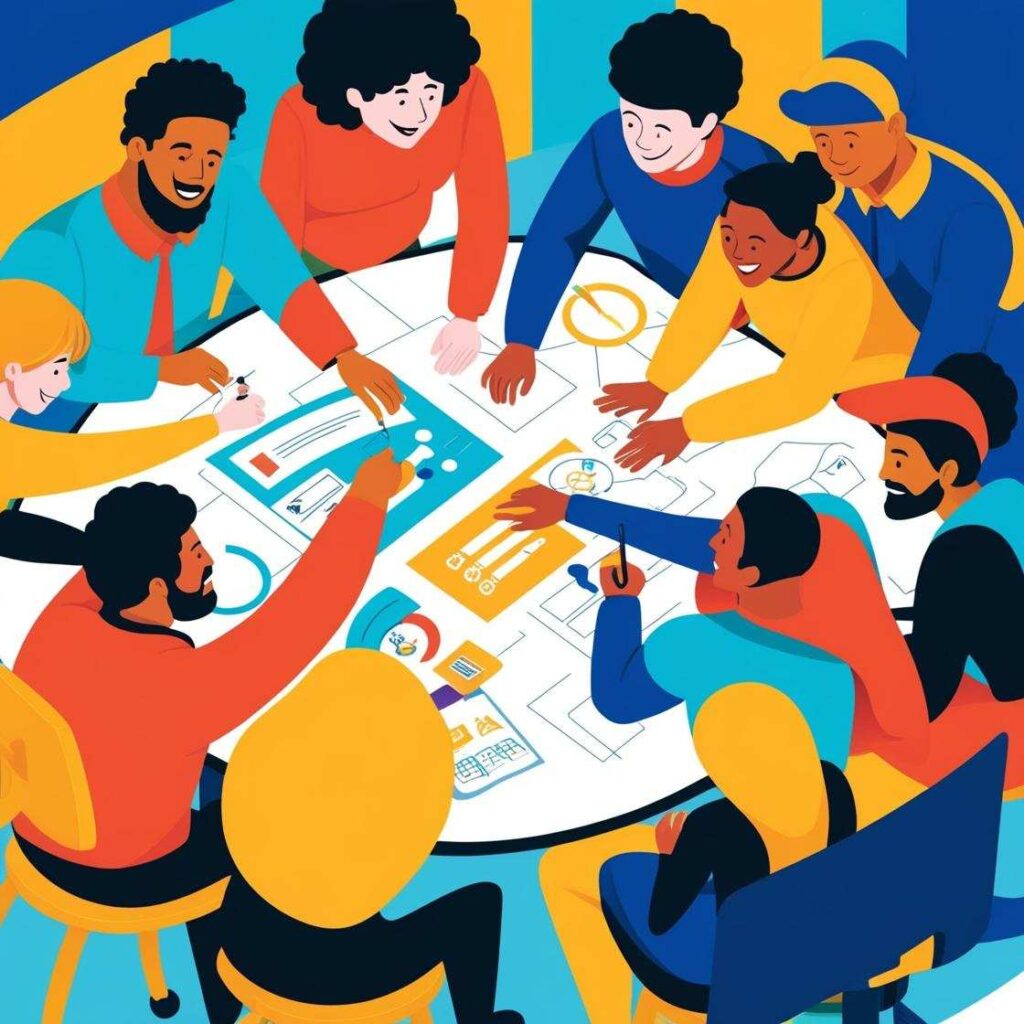It’s Monday. You clock in, do your tasks, clock out. Another day, another paycheck. That’s how it works, right?
You give your time. They give you money. Fair deal.
But what if work was more than just time-for-money?
What if you weren’t just an employee, but a multiplier—someone who makes the team better, not just busier?
In many Filipino workplaces, people think, “I do my job. That’s enough. It’s not my business to make the company grow.”
Sounds reasonable. But here’s the problem:
That thinking keeps you stuck.
You do what’s required, nothing more. No initiative. No growth. No new opportunities. Just another cog in the machine—easily replaceable, easily forgotten.
But then there are multipliers.
They don’t just show up. They show up differently.
What Multipliers Do
↳ They don’t wait to be told. They see a problem and fix it. They find opportunities and take action.
↳ They lift others up. They don’t just do great work—they help others do great work, too.
↳ They make things better. Processes, culture, teamwork—wherever they go, things improve.
↳ They attract opportunities. Promotions, leadership roles, new projects—multipliers don’t chase success. Success finds them.
Most people stay in their lane. Do what’s expected. Hope someone notices.
Multipliers play bigger. They create impact. They make themselves undeniable.
And that’s why they win.
So, which one are you?
Just another employee?
Or the reason the whole team moves forward?

Beyond the Paycheck Mentality
What’s work to you?
For most, it’s simple: hours for salary. Do your job, get paid, repeat.
Seems fair. But here’s the thing—this mindset is like wearing blinders. You see the paycheck but miss everything else.
The paycheck mentality is comfortable. You know what’s expected. You don’t have to push yourself. No risk, no stress.
Sounds safe, right?
But here’s the truth: comfort zones kill growth.
Sticking to just what’s required makes you a cog in the machine. Maybe useful, but easily replaceable. You stop challenging yourself. You stop learning. And in a world that moves fast, standing still means falling behind.
Now, think about the bigger picture.
If you see work as just a way to get paid, you don’t give your best. And if enough people feel the same, the entire team suffers.
🚫 Fewer ideas.
🚫 Less collaboration.
🚫 No innovation.
In workplaces where “good enough” is the standard, mediocrity takes over. And no one wins.
Let’s be real—opportunities don’t go to those who just show up.
They go to people who show initiative.
Promotions, leadership roles, bigger projects—these don’t happen because of tenure. They happen because you bring value beyond your job description.
If you’re doing the bare minimum, you’re not just limiting your company’s growth—you’re sidelining yourself from the opportunities that could transform your career.
The Power of Being a Multiplier
The moment you let go of the paycheck mentality, you unlock something bigger—the mindset of a multiplier.
But what does that mean? What is a multiplier?
A multiplier isn’t just an employee. They don’t just do their job; they elevate the people around them.
They amplify success, drive innovation, and challenge the status quo.
Unlike those who stay confined to their role, multipliers expand their impact. They take ownership. They see problems before they happen. They make things better—not just for themselves, but for everyone.
So, how can you be a multiplier? Here are simple steps. I will expound these later.
↳ Step beyond your job title. Your real value isn’t in your position—it’s in what you contribute. Find ways to create impact beyond your tasks.
↳ Help others grow. Multipliers don’t just perform well; they lift their teams. Share knowledge. Mentor. Bring out the best in others.
↳ Challenge the status quo. Don’t settle for “this is how we’ve always done it.” Look for ways to improve, innovate, and move forward.
↳ Drive a culture of learning. Growth isn’t just personal—it’s collective. Encourage curiosity, experimentation, and pushing limits.
↳ Think beyond personal success. Multipliers don’t just chase achievements for themselves. They measure success by how much they contribute to others.
Workplaces thrive when multipliers lead.
They inspire action. They spark innovation. They make a difference.
The best part?
Multipliers don’t wait for permission to lead. They create impact wherever they are.
So, ask yourself: Are you just working for a paycheck? Or are you creating something bigger?

Magnify Your Impact as a Multiplier
Most people just do their jobs. They focus on tasks, meet expectations, and collect their paycheck. That’s the deal, right?
But multipliers? They play a different game.
They don’t just do work—they amplify it. They make their teams sharper, their organizations stronger, and their impact undeniable.
Grow Yourself, Expand Your Opportunities
The moment you step into the multiplier mindset, your personal growth accelerates.
↳ You’re no longer limited to your job title. You expand your skillset, explore new challenges, and become someone people depend on, not replace.
↳ You stop waiting for opportunities and start creating them. Multipliers are always learning, always evolving—which means they’re always moving forward.
↳ You get noticed. People recognize those who elevate others. Promotions, leadership roles, and bigger opportunities follow those who take initiative, not just orders.
Elevate Your Team’s Performance
Multipliers don’t just grow themselves—they bring out the best in others.
↳ They create a culture of collaboration. Instead of hoarding knowledge, they share it. Ideas flow. People contribute freely. The whole team rises.
↳ They set high standards—and inspire others to meet them. When you consistently push for excellence, people around you either step up or step aside.
↳ They trust and empower. Instead of micromanaging, they delegate with confidence, giving their team the room to grow, make decisions, and own their work.
Shape the Organization’s Future
Multipliers don’t just impact teams—they shift entire organizations.
↳ They don’t just hit targets—they exceed them, setting new benchmarks for success.
↳ They drive innovation. Their forward-thinking approach challenges the status quo and makes room for new ideas to thrive.
↳ They build an unstoppable culture. One where people feel valued, challenged, and motivated to do their best work.
Multipliers don’t just change what gets done.
They change how people think about work.
They turn companies into industry leaders. They shape cultures that attract top talent. They create teams that don’t just work together—they win together.
You can stay in your lane, do your tasks, and wait.
Or you can step up, challenge limits, and become a multiplier.
Because once you stop thinking like an employee and start thinking like a multiplier—everything changes.
Let’s talk about the ways you can embody the multiplier effect.
Subscribe to the Leadership Habits series.
Embodying the Multiplier Effect
Now that we understand the immense value of being a multiplier, how do we embody this in our daily professional lives?
I will provide seven actionable ways to become a multiplier.
1. Teach What You Know.
Most people guard their knowledge. They think, “If I teach them what I know, what makes me valuable?”
But multipliers think differently. They know that the more they share, the stronger everyone gets—including themselves.
Sharing your expertise isn’t just being helpful. It’s how you create value beyond your own work.
You might think, “But no one asked me to teach.” That’s exactly the point. Multipliers don’t wait for permission. They look for ways to share, mentor, and elevate others—because when knowledge flows, teams thrive.
↳ Identify your strengths. What do people already ask you for help with? That’s where your expertise is.
↳ Be intentional about teaching. Offer to help a colleague struggling with a task. Lead a short training session. Write down processes others can use.
↳ Make knowledge-sharing normal. When you teach, encourage others to do the same. A team that learns together, wins together.
Multipliers don’t just do their jobs—they make everyone better.
So, what’s one skill you can share today?
2. Lead, Mentor, Multiply.
Some people think leadership is a title. It’s not. It’s how you show up, how you support others, and how you help them grow.
You don’t need permission to lead. You don’t need a corner office to mentor. You just need the willingness to elevate the people around you.
Leadership and mentorship create the multiplier effect because they don’t just improve individuals—they raise the standard for entire teams. The best workplaces aren’t built by rules and processes. They’re built by people who guide, inspire, and challenge each other to be better.
↳ Adopt a leadership mindset, no matter your role. Don’t wait for a title. Lead by example. Show initiative. Take responsibility.
↳ Be approachable and available. Great leaders listen. Be the person your team can turn to—not just for solutions, but for support.
↳ Encourage strengths and give honest feedback. Help people see what they do well. Push them where they need to grow. Make improvement a habit, not an occasional event.
↳ Demonstrate the values you expect. People learn more from what you do than from what you say. Your work ethic, attitude, and consistency set the tone.
↳ Guide, don’t dictate. Mentorship isn’t about telling people what to do. It’s about helping them see possibilities, make decisions, and move forward with confidence.
Multipliers don’t just focus on their own success. They create an environment where everyone succeeds.
So, who are you mentoring today?
3. Fuel Innovation. Spark Creativity.
Most teams stick to what works. They follow processes, avoid risks, and play it safe.
But multipliers think differently. They don’t just follow—they create. They challenge outdated thinking, encourage new ideas, and push for better solutions.
Innovation and creativity aren’t just about flashy ideas. They’re about progress. A team that experiments, learns, and adapts will always outgrow one that sticks to “the way we’ve always done it.”
↳ Create a safe space for ideas. If people fear judgment, they won’t share. Make it clear that all ideas are welcome—especially the unconventional ones.
↳ Encourage brainstorming. Set aside time for idea-sharing, problem-solving, and blue-sky thinking. Some of the best innovations come from the simplest conversations.
↳ Support calculated risks. Not every idea will work—but every attempt teaches something. Reward effort, not just success.
↳ Lead with creativity. Share your own bold ideas. Show how thinking differently can lead to smarter solutions.
↳ Redefine failure. Failure isn’t an endpoint—it’s a stepping stone. When people see mistakes as lessons, they take more creative risks.
Multipliers don’t just work within a system—they improve it. They create workplaces where innovation thrives and teams stay ahead.
So, what’s one new idea you can introduce today?
4. Bring People Together.
Most people work with others. Multipliers bring people together.
They don’t just collaborate—they create collaboration. They see the strengths in others, connect the right people, and build teams that perform beyond what individuals can achieve alone.
Great teams aren’t just a mix of skills. They’re a synergy of strengths. The best workplaces don’t just get work done—they innovate, solve problems, and grow together.
↳ Encourage real teamwork. It’s not about working alongside people—it’s about working with them. Find ways to combine skills, knowledge, and perspectives to achieve bigger results.
↳ Make every voice matter. In meetings and discussions, ensure that everyone has a say. Multipliers don’t dominate conversations—they bring out the best in others.
↳ Create cross-functional opportunities. When people collaborate across different teams and backgrounds, creativity explodes. Help your team see beyond their immediate roles.
↳ Be the bridge. When conflicts arise, don’t let them divide your team. Help people find common ground. Foster understanding. Make connections that strengthen, not separate.
↳ Build a culture of shared success. When teams win, individuals grow. When individuals grow, teams win. Multipliers understand that success isn’t a solo act—it’s a collective effort.
A workplace where everyone contributes, learns, and thrives together is a workplace that never stops improving.
5. Speak Clearly. Listen Fully.
Most people communicate to be heard. Multipliers communicate to be understood.
They don’t just send messages—they create clarity. They don’t just talk—they listen. They don’t just give instructions—they build alignment.
Without clear communication, even the best teams fall apart. Misunderstandings lead to mistakes. Unspoken issues turn into conflict. Unclear expectations create frustration.
But when communication is done right? Trust grows. Teams move faster. Decisions become smarter.
↳ Be clear and concise. Don’t bury your message in fluff. Say what needs to be said—directly, respectfully, and with purpose.
↳ Listen to understand, not just to respond. Most people are just waiting for their turn to talk. Multipliers listen deeply, making others feel heard and valued.
↳ Encourage honest feedback. Communication isn’t about being right—it’s about getting better. Be open to different perspectives. Create a space where feedback flows freely.
↳ Check for understanding. Never assume people “get it.” Ask, clarify, and confirm. A simple “Does this make sense?” prevents massive misunderstandings later.
↳ Use the right tools. Some people communicate best in writing. Others prefer quick chats. Great communicators adapt their approach to fit the situation.
Multipliers make communication a bridge, not a barrier.
6. Step Back. Lift Others.
Most people hold on to control. They think, “If I want it done right, I have to do it myself.”
But multipliers? They think differently.
They trust their team. They delegate with purpose. They empower others to lead, take action, and grow.
When you empower colleagues, you don’t just lighten your workload—you increase your team’s capacity to succeed. You build confidence, unlock potential, and create an environment where people step up—not because they have to, but because they want to.
↳ Find opportunities for others to lead. Look for tasks and projects where team members can step up. Give them ownership, not just assignments.
↳ Trust and step back. Once you delegate, let them run with it. Micromanaging kills confidence. Show that you believe in their abilities.
↳ Provide support, not control. Offer resources, guidance, and coaching—not constant oversight. Be there when needed, but let them take charge.
↳ Celebrate progress, not just results. Acknowledge effort. Recognize initiative. People grow when they know their contributions matter.
↳ Turn mistakes into learning. When something goes wrong, don’t take back control—help them figure out how to improve. Growth happens in the process, not just the outcome.
Multipliers don’t create followers. They create more leaders.
7. Lead by Example. Inspire by Action.
Most people wait for leadership to set the tone. They think, “If the culture isn’t great, it’s not my problem.”
But multipliers? They are the culture.
They set the standard. They bring energy, integrity, and resilience to work every day. They don’t just do their jobs—they influence how work is done by the way they show up.
People don’t follow words. They follow actions. When you live the values you expect from others, you naturally inspire them to do the same.
↳ Reflect on the leaders you admire. What makes them different? Integrity? Resilience? A positive attitude? Embody those traits in your daily interactions.
↳ Be consistent. Say what you mean. Do what you say. People respect leaders who are predictable in their principles, not just their words.
↳ Show resilience under pressure. When things go wrong, stay steady. Your response sets the tone for how the team handles challenges.
↳ Own your mistakes. No one follows a leader who pretends to be perfect. Admit when you’re wrong. Learn. Grow. Set the example.
↳ Lift others up. Recognize efforts. Celebrate wins. Support people when they struggle. A true leader makes everyone around them better.
Multipliers don’t demand excellence—they demonstrate it.
Be a Multiplier
In this journey from conventional employee to multiplier, we’ve explored not just a shift in actions, but a transformation in mindset.
Being a multiplier is about transcending the limitations of the paycheck mentality, and embracing a broader vision of what it means to be a professional.
It’s about seeing beyond the confines of your job description and recognizing the potential impact you can have on your colleagues, your organization, and even the industry.
Share expertise, provide leadership, drive innovation, foster collaboration, communicate effectively, empower others, and be a positive role model. Doing these will enhance your own career. And you amplify the success of everyone around you.
The path to becoming a multiplier is not just a series of steps; it’s an ongoing commitment to growth, learning, and leadership. It’s about making a conscious choice every day to be more than just an employee, but a catalyst for positive change.
This isn’t just about doing a job; it’s about making a difference.
It’s about being the kind of professional who doesn’t just add value but multiplies it, transforming not only their own career but also the environment and people they work with.
So, as we conclude, the question isn’t whether you can become a multiplier – it’s whether you’re ready to take on this transformative role.
Are you ready to shift gears, expand your influence, and become a multiplier in your professional world?
The journey starts now.
10x Community Posts
If you’re tired of knowing but not doing…
Let’s make one shift easier to live daily.
→ Shift Experiences


